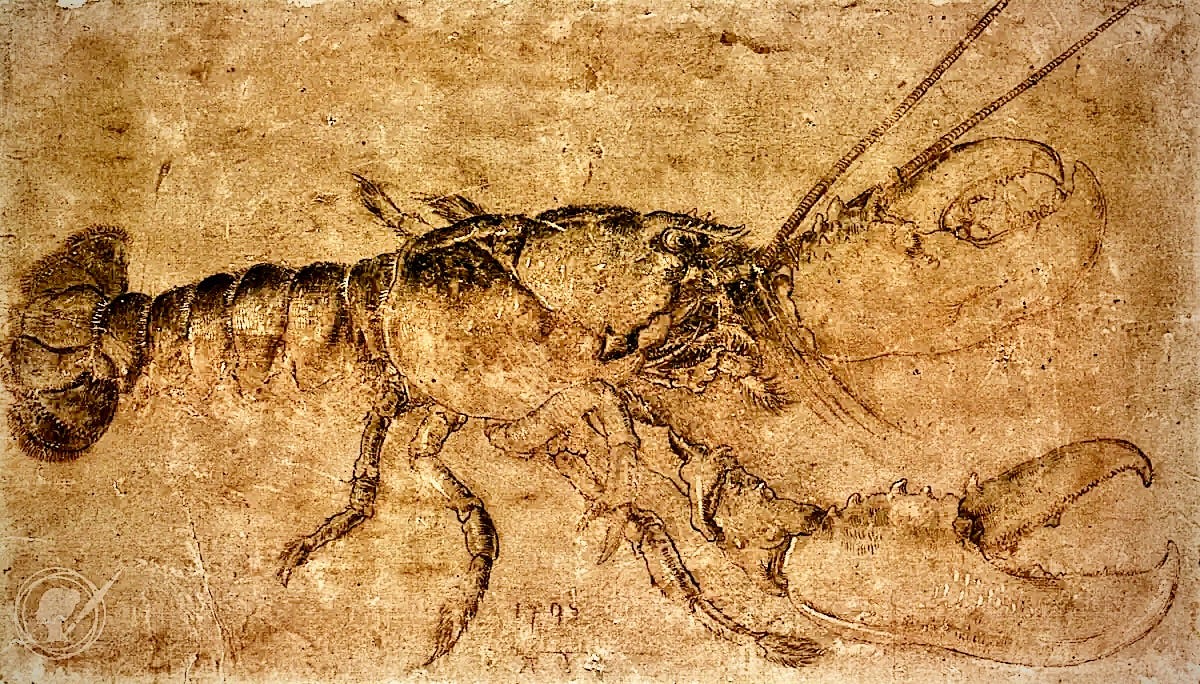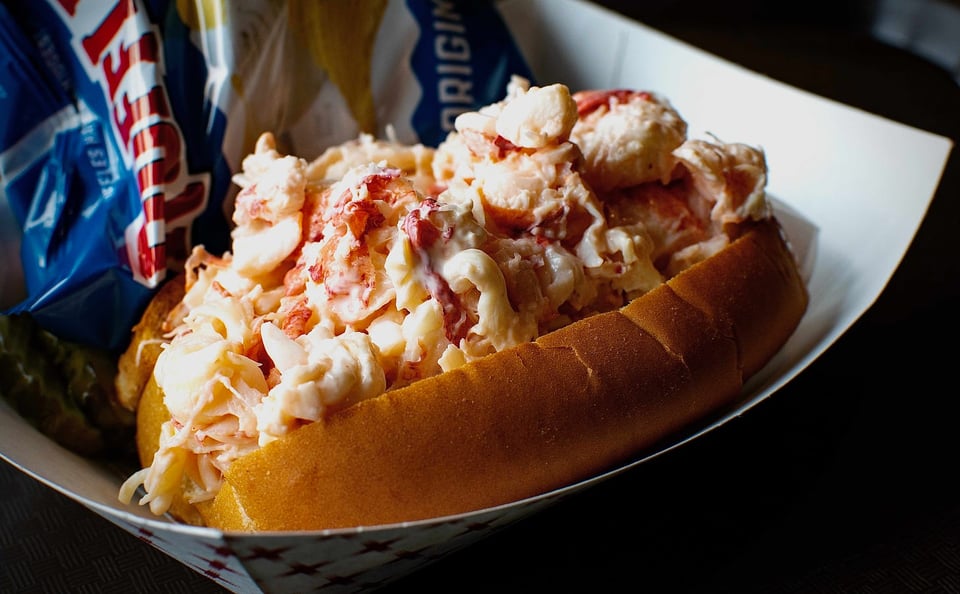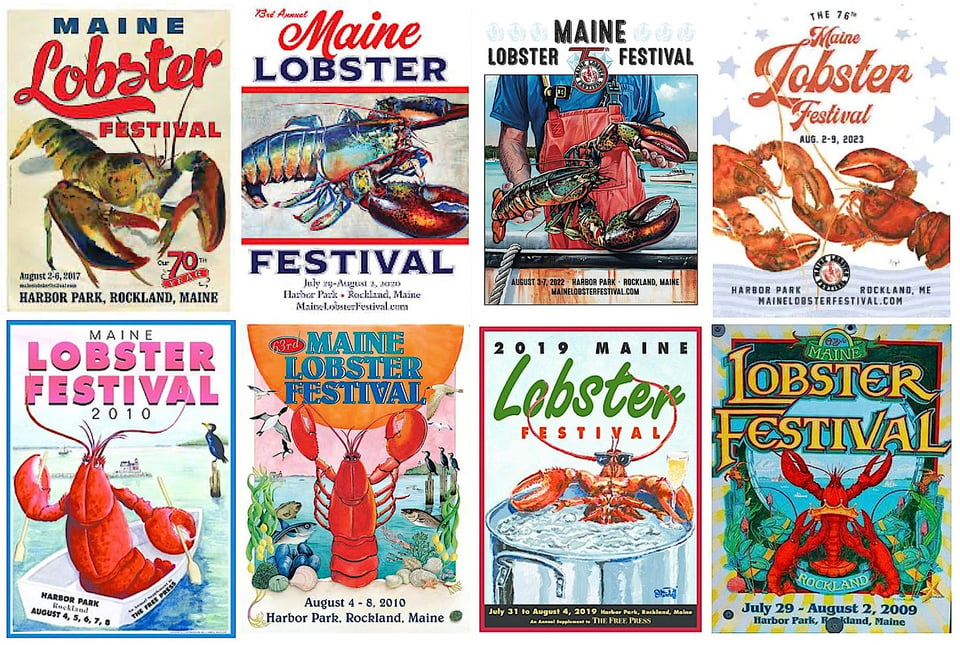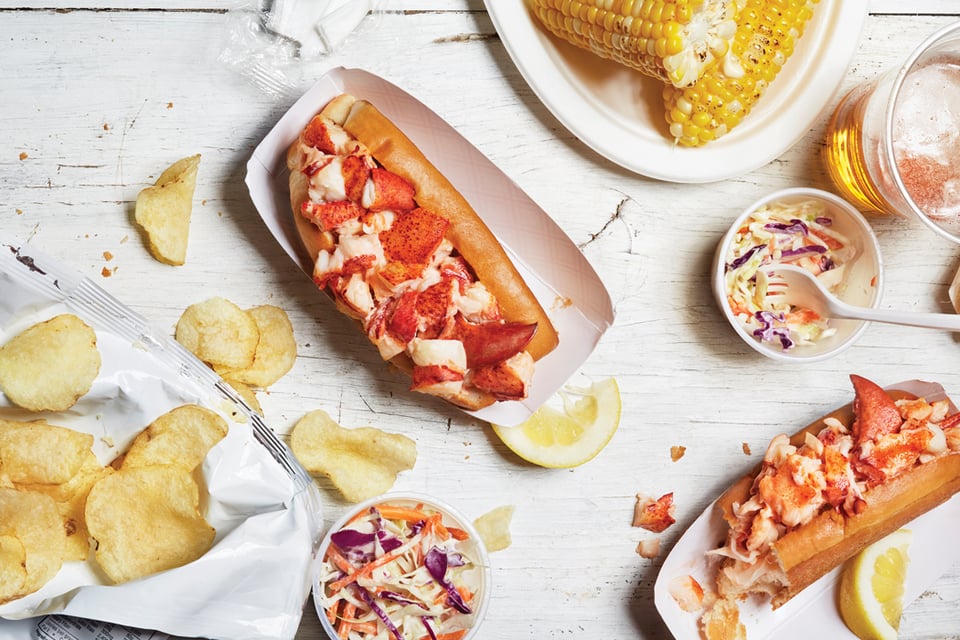Notable Sandwiches #108: Lobster Roll

Welcome back to Notable Sandwiches, the feature where I, alongside my noble editor David Swanson, wade our way through the treacherous shoals of Wikipedia’s List of Notable Sandwiches, in alphabetical order. This week, we say goodbye to summer with a New England icon: the lobster roll.

The first time I ever ate lobster, I was emerging from an entire lifetime spent keeping kosher. This period, my freshman year of college, was one of joyous exploration: my first burrito; my first time eating phở; my first slice of pepperoni pizza. I had enjoyed the foods of my childhood greatly and to this day go weak in the knees over a good bowl of matzoh ball soup, but at nineteen, freeing myself from an elaborate system of dietary laws opened up an enormous vista of culinary delight. Among these new foods—each made infinitely more delicious by their aura of transgression—were all sea creatures that did not possess fins and scales: a category in which the lobster, that armored, pincered sea-bug, was emphatically included.
Kashrut, as practiced in the Orthodox community from which I had come, was an all-encompassing practice; I had spent so much of my life examining food labels for kosher-certification symbols, walking past the vast majority of restaurants I’d ever seen. I had truly lived a shtetl life, and that was reflected perhaps most profoundly in my rigid culinary horizons. As a method of community self-segregation, eating kosher is unparalleled; it also meant that vacations involved boiling the silverware in rental-house kitchens and grocery shopping in new locales, the concept of a cuisine-focused vacation being more or less alien to the kosher family. Thus it was that I had visited New England, my father’s childhood stomping grounds, countless times throughout childhood, including the crustacean-choked beaches of Maine, without ever once considering the lobster.

All this changed in my freshman year. My college was hardly a bastion of diversity, but from my comically sheltered background—ensconced in a heavily Orthodox town, attending Orthodox schools, synagogues, and summer camps—it felt mind-bogglingly capacious. Men’s heads looked naked without yarmulkes; I quickly discovered that my English was dialectical, peppered with Yiddishisms that I self-consciously jettisoned. My roommate’s name was Ashley (“Ashley!” I said to myself. “What an exotic name!”)—and within the first month I had met two of my future lifelong friends, the first people I’d ever met named Peter and Paul.
At any rate, that very autumn my glorious, tall and beautiful gentile roommate Ashley invited me to a big state fair type event back in her Maine hometown. Arriving at this warm, loud, briney confabulation of tents full of fried food and agricultural exhibits, I decided it was time to step even further out of my comfort zone and try lobster for the first time. This was surely the right place—Maine! Surrounded by gentiles! So, all false bravado, I strolled up to one of the many lobster purveyors and ordered myself one. A whole lobster, that is. I was completely confounded when this segmented red creature, entirely encased in its shell, was handed over to me on a paper plate with a little plastic shot glass of drawn butter. I peered down at it, bemused. How on earth did goyim eat these things?
When she stopped laughing, Ashley informed me that whole lobster isn’t really a “walking-around” food. We found a picnic table and she patiently walked me through the process of segmenting, cracking, and prying the flesh out of this alien sea insect, and dipping it in the butter. I even ate the tomalley, the slimy green hepatopancreas from the lobster’s center. It was only after this painstaking and somewhat disgusting process—in which at every moment I was acutely aware of the absence of fins and scales, but the manifest presence of alienation and peril, in my new life—that I looked up and realized that the very same stand also offered lobster rolls. Which are a consummate walking-around food, offer a soft bun in lieu of a hard shell, and are a far less daunting approach to eating chitinous denizens of the deep.

Therein, of course, lies their popularity: while there’s a certain luxe-feeling theater in the shell-cracking, claw-breaking process of eating a whole lobster, if what you are interested in is the succulent, salty-sweet flesh, a lobster roll offers it in plenty, without all the fuss. It still feels luxe, thanks to the price inflation and scarcity of lobster, long industrially trapped out of its once bristling ubiquity in New England.
Here I feel compelled to note that—despite David Foster Wallace uncritically regurgitating this myth in his legendary 2004 essay “Consider the Lobster”—lobster was never, in fact, so abundant it was routinely fed to prisoners, which would be expensive and totally impractical for any prison even slightly inland. Colonial-era inmates ate mostly salt pork and hardtack, according to historians who’ve critically examined the myth, unlike Wallace the literary legend. Not even in a footnote!
Speaking of that essay: it does feel somewhat mandatory to mention it if writing something even mildly serious about lobster, given its reputation. Revisiting it for this piece was like revisiting a past self, one that, reading it for the first time (also in college), was utterly enthralled. I really loved Wallace for a long time—I somehow made it all the way through Infinite Jest, not to mention his books of short stories. I even think the backlash against him is somewhat ill-considered and his writing has enduring merit, although the revelations about him being absolutely putrid and abusive to the women in his life brings a new insight to re-assessing his work. Particularly this essay, whose central feature is a discourse on consideration and empathy.

Rereading “Consider the Lobster” two decades after it was published, I’m struck by its multiple, contradicting valences. Visiting the annual Maine Lobster Festival, his condemnation of tourism (“As a tourist, you become economically significant but existentially loathsome, an insect on a dead thing”) and fierce disgust at the proximity of strangers eating at a food festival (“I have never understood why so many people’s idea of a fun vacation is to don flip-flops and sunglasses and crawl through maddening traffic to loud hot crowded tourist venues in order to sample a ‘local flavor’ that is by definition ruined by the presence of tourists”) bespeak a certain mannered misanthropy.
At the same time, the essay itself is a thoughtful, if strangely naïve, approach to the ethical questions of animal consumption; Wallace was forty-two when the essay was published, and appears to be grappling for the first time in his life with these questions, and thus his sources are low-hanging fruit: PETA’s famous video “Meet Your Meat,” about factory farming; Peter Singer’s militant, philosophy-flavored “Animal Liberation,” a book given to me by a vegan boy I had a crush on at the age of fifteen, prompting a brief and unsuccessful vegetarian phase thwarted by the lure of chicken soup.

There’s something both endearing and lightly irritating about this man confronting Gourmet Magazine readers with the immorality of their louche, sybaritic, lobster-laden lifestyle. Of course, it’s always inconvenient to ponder moral questions about the pain and consciousness of the things we eat at any time, but it feels odd in 2024 to read this grown man responding to factory-farm conditions with breathless shock (perhaps this knowledge was less culturally pervasive at the time), while at the same time self-consciously disavowing any intent to be “preachy” or “irksomely PC” or “sentimental.” The desire not to be gauche undercuts the central moral question he poses: “Is it all right to boil a sentient creature alive just for our gustatory pleasure?” With consideration of the sentience and the live boiling in equal measure (he uses the word “nociceptors” three times, for example).
The framing of a moral stance as a question begins to feel disingenuous as the essay progresses, and Wallace mounts what is effectively a case against eating lobster. I suppose what I was struck by most was how this person had to be literally confronted by the World’s Largest Lobster Cooker to even begin to ponder the ethics of lobster consumption, and eat four decades of chicken before learning anything about the conditions in which commercially farmed chickens are housed. To require such literal confrontation to begin to empathize bespeaks—despite the front of compassion exhibited in the essay—a paradoxically shallow and facile approach to the faculty of empathy. Then again, this is a man who tried to push his ex, the poet Mary Karr, out of a moving car, among other frightening trespasses against her and others.
The Sword and the Sandwich is a newsletter about deadly serious extremism and serious sandwiches. Please consider supporting this work with
a paid subscription.
“I've got to say,” Karr told WBUR in 2018, “so many young women reached out to me online, who had been hit in the face by him, or lied to, or students of his he slept with, that I am glad I spoke up.”
Did he ever consider, of the women he beat and threatened, that—as he writes of the lobster—“it is hard to deny in any meaningful way that this is a living creature experiencing pain and wishing to avoid/escape the painful experience”?
I’m just asking questions.
Although… in answering his central question, moral cowardice may be one reason I prefer lobster rolls to whole lobster. And why I tend not to buy and boil them alive myself. (I am also lazy, more or less morally indifferent to the suffering of meat animals, a passionate carnivore, and unlikely to reform, accepting the basic cruelty that feeds me as a natural byproduct of man’s dominion over nature. Perhaps I would not eat an ortolan or an endangered species, but I tend to think cows and chickens, at least, have gained quite a lot out of their symbiosis with humanity—they are phenomenally numerous and successful as a direct result of being the favored of our tables. Lobsters not as much, perhaps—at least, not until an economical and practical model of farming them is developed, as it has for salmon, shrimp and oysters. Perhaps I’m the sybarite that Wallace condemns; then again, my carapace is perhaps not as hardened as his to fellow humans.)

Returning to the hand food at hand: there’s some regional posturing about whether a lobster roll goes best with butter (Connecticut) or mayonnaise (Maine), but I embrace either doctrine with equal enthusiasm, although my current broke status means I seldom indulge in either. I should also note that the reason this essay is a week late is because the last time I tried, I ordered a research lobster roll, and was struck down with gastrointestinal symptoms so violent I could not write. Maybe this was an elder god’s unheeded warning about my moral ambivalence; maybe it was a bad batch; maybe it was caused by something else entirely. Either way—slings, arrows, and exoskeletons notwithstanding—I’m glad I had that first forbidden taste of lobster all those years ago, that I’ve spent the back half of my life in a suffusion of flavor. I still feel the nape hairs of my neck lift at the buttery deliciousness of transgression. I have considered the lobster, through the lens of the prohibition of god and of man, and found it delicious.

-
You've got to try a good Lobster Mac n Cheese. Next time the money gods bless you. 🤞🏼🤓❣️
-
i found out about your newsletter because of your political analysis, but these sandwich posts have been stellar. thank you for expanding my culinary knowledge and general vocabulary--i'm going to use "sybaritic" as much as possible.
-
I'm enjoying your writing more than that in any other subscription I have! This post was eye-opening for me because of your enthusiasm for lobster, which I don't like, and about DFW because I've avoided him without reason for years. But mostly it's your introduction describing your kosher upbringing and breaking away that touched me. Thank you.
-
I love lobster (my partner thinks it's merely a vehicle for delicious butter and doesn't see the point) but I have never had a lobster roll -- and they always look so tempting when I see them online or on TV. I don't get to the N.E. very often.
-
Such delicious writing!
-
Ha, my lobster initiation was similar. I grew up in a small town in Texas where no one had ever had lobster. When I was in law school, I went to DC to interview for a job at a white shoe law firm. They treated me to lunch at a fancy French restaurant. I was seated on the banquette just a foot or two from Vice President Walter Mondale. When I saw lobster on the menu, my eyes grew bigger than my brain, and I ordered it. When they brought the whole creature, I had no idea what to do. So I plunged in, and proceeded to spray lobster juice on the Vice President and everyone else nearby. I can report that Mr. Mondale was a perfect gentleman, and never said a word.
-
I love this piece! I too have read Infinite Jest and assorted other of his stories, but was not surprised to learn that he is, indeed, a douchey straight whyte guy. And LOBSTER rolls...one of the joys of my east coast road trip in 2020.
-
My first introduction to lobster was in a restaurant when I was 3 or 4.
The waitress placed the platter with the whole lobster down in front of my father, and I took one look at that bright red alien and I went up and over the back of the booth to escape.
-
"then again, my carapace is perhaps not as hardened as his to fellow humans." This is worth exploration. The venn overlap of vegans and misanthropes is pretty high in my experience. Which comes first?
Add a comment: